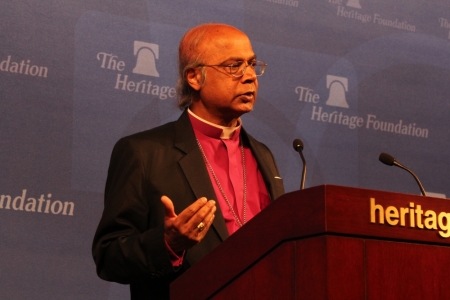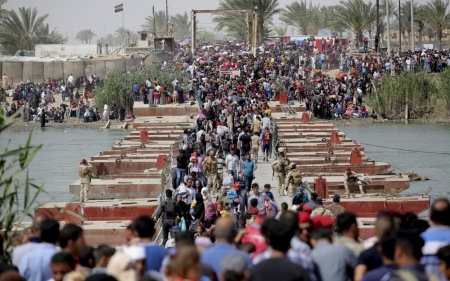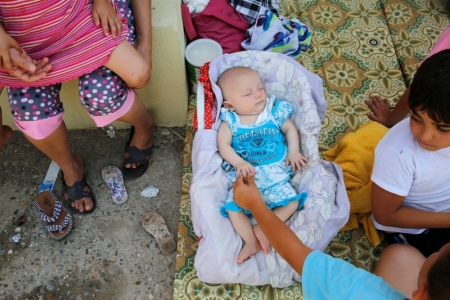Christian Refugees Escaping ISIS' Reign of Terror Bring Hope to Iraq's Religious Minorities, Says Bishop Michael Nazir-Ali

WASHINGTON — Although Iraqi refugees who fled their homes to escape ISIS are now homeless and living in tents, containers and other makeshift housing arrangements in the Kurdish north, Bishop Michael Nazir-Ali said Wednesday that the morale of displaced refugees is much higher than the media is portraying.
Nazir-Ali, who is the former Anglican Bishop of Rochester, an author and current president of the Oxford Centre for Training, Research, Advocacy and Dialogue, explained during a discussion at the Heritage Foundation that the non-discriminatory involvement that the Christian church community has put forth in supporting Iraqi refugees of all faiths has led those displaced by the barbaric Islamic State to be uncharacteristically hopeful.
Along with an ecumenical delegation of bishops, Nazir-Ali recently visited with refugees in northern Iraq as a guest of the Chaldean Catholic Church and was astounded to find that the refugees, who have lost just about everything due to ISIS, were in much higher spirits than he was led to believe before his visit.
"I had expected a fearful ragbag of refugees with no morale, living under very bad conditions and so on. This is not, in fact, the case," Nazir-Ali explained. "There is no substitute for going. What I had been sold in the media about the condition of the refugees was quite different from what actually I found."
One of the two main reasons that Nazir-Ali, who also previously served as Bishop of Raiwind, Pakistan, attributed to the positivity among Iraqi refugees was the presence of the churches, most notably the Chaldean church.
"What has given the refugees this sense of hope is the work of the churches. I know the media doesn't talk about it but, particularly the work of the Chaldean Catholic Church, the eastern church to which most Iraqi Christians belong, has been beyond criticism." the 65-year-old bishop said. "They have delivered without discrimination to refugees, whether they don't belong to their own denomination and even to those who are not Christian."

The bishop explained that the church has been instrumental in providing various necessities to refugees such as shelter, clothing, food and other basic needs. The church's role has been so vast in helping not only Christians but also other religious minorities, that Yazidi leaders have even told Nazir-Ali how grateful they are for the church.
"Yazidi leader said to me in Dohuk, he said that 'Our faith does not have the structure to help us in this situation. The church has the structure and helps not only its own people but also ourselves,'" Nazir-Ali explained. "I think this is just something for the record."
Nazir-Ali also attributed the high morale of the refugees to the generosity of the Kurdish Regional Government, which has accommodated and welcomed all refugees, while the Kurdish peshmerga has held its ground against ISIS' advances.
"One [reason] is the hospitality of the KRG and the relative safety that they have provided the Christian and Yazidi refugees within the KRG," he stated. "This is admirable in a region like that for a government to provide such hospitality to such large number of refugees, who may well change the identity of the KRG because most of these refugees are not Kurdish."
Although the KRG and the churches have provided great amounts of aid to ensure the well-being of the refugees, Nazir-Ali said that there is still a need for more support from the international community.
"We still need emergency help for refugees such as shelter. People are still living in containers — they are made very nice but, nevertheless, they are containers," he said. "The church has been able to rent flats for people. There are three families to a flat, rather than one family to a flat, so they are overcrowded. Unused buildings are used.… Again, the facilities are very basic there."
Another concern that the bishop has is that although younger refugee children have access to education, teenagers are not being educated, which he claims is a "dangerous" sign.
"It's a recipe for trouble in the future," Nazir-Ali asserted.
Nazir-Ali contended that there also needs to be a partnership that is designed to help refugee families start their own businesses and figure out ways they can make money and get back on their feet.
"I believe that there could be a very good initiative with the KRG and the churches in providing microenterprise opportunities for families, men and women, so that people can earn their living," he argued. "Some of them are earning their living by working outside in the general community but many are not. I think indefinite idleness can not be good for people."
There is at least one organization, called Preemptive Love, that — among many other things — has already helped some Iraqi refugee families start up their own businesses and plans to spend between $100,000 and $150,000 to send refugee children back to school.
Although many Iraqi refugees are looking for ways to completely leave Iraq, Nazir-Ali explained many displaced Iraqi Christians want to return to their homelands in the Nineveh Plain but won't without international protection. He said it is possible for the international protection to be led by non-Western entities.
"It is not necessary for such a force to be Western or Western led," Nazir-Ali contended. "I give the example of the African Union forces in Somalia, which has been quite effective and supported by the international community but not a Western force. However the force is constructed, I think something like that is necessary."






















